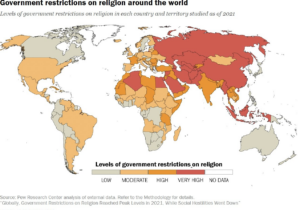On April 25, the Canadian government released the final report of the National Defence Advisory Panel on Systemic Racism and Discrimination. Part III section 6 of this report addresses “Re-Defining Chaplaincy,” and it reveals both secularist bigotry and the current Canadian government’s continuing campaign to use state funds to support the current government’s “values,” even though those purported values have no legal grounding.
The Panel notes that “for some Canadians, religion can be a source of suffering and generational trauma. This is especially true for many lesbian, gay, bisexual, transgender, queer and two-spirited members of Canadian society. And Indigenous Peoples have suffered unimaginable generational trauma and genocide at the hands of Christian religious leaders.” It further asserts that “some chaplains represent or are affiliated with organized religions whose beliefs are not synonymous with those of a diverse and inclusive workplace.”
It adds that “there are varying degrees of misogyny, sexism and discrimination woven into the philosophies and beliefs of some mainstream religions currently represented in the cadre of chaplains in the CAF” and speaks of “genocide at the hands of Christian religious leaders.” It gives as examples “some churches’ exclusion of women from their priesthoods” as well as “sexist notions embedded in their religious dogmas.” It also condemns those faiths that seek “conversion” of others.
As a consequence of this perceived perfidy, the Panel recommends that the military consider not hiring “chaplaincy applicants affiliated with religious groups whose values are not aligned with those of the Defence Team.” This would, of course, exclude possible chaplains from the Catholic, Orthodox, Oriental Orthodox, and some Protestant churches, as well as many applicants from other faiths, including Judaism and Islam.
This recommendation that the government should engage in systematic religious discrimination in selecting chaplains reflects three things. First, it neglects the official role of chaplains, which would damage the military. Second, the government is increasingly demanding that Canadians conform their views to the government’s preferences, its “values.” Third, with an almost total lack of self-awareness, the Panel is propagating the very discrimination that it claims to oppose.
On the first, Scott McCaig, the Catholic military ordinary for Canada, described this recommendation to redefine the chaplaincy as “deeply problematic and regrettable.” He pointed out that chaplains are required to and in fact do gladly minister to all persons “regardless of race, gender, religion or nonreligion,” and that such care “specifically excludes proselytization or any imposition of religious belief.” He added that chaplains are responsible for “accompaniment, general counseling, ministry of presence and availability, discernment of morale and the authentic needs of members, and support for the military chain of command.” Consequently, removing chaplains that represent the wide range of religious beliefs in Canada could have major effects on military morale. Too bad if you have to go into combat and might need last rites.
Equally troubling, the government has renewed its attempt to rule people in the name of some extra-legal things called “values.”[1] Previously in 2018, the Canadian Supreme Court undercut Trinity Western University’s attempt to establish a law school because it thought that the University’s view of marriage went against the “Charter values” in Canada’s Charter of Rights and Freedoms. However, the Charter contains legal guarantees, not values, and is completely silent on the latter. It was not the Constitution or a law that sank TWU but some undefined “values.”[2]
Similar moves have happened with respect to abortion, and here a little background is needed. On May 3, 2022, in the wake of the leak of a United States Supreme Court draft opinion on Dobbs v. Jackson Women’s Health Organization that would overturn Roe v. Wade, Canadian Prime Minister Justin Trudeau wrongly tweeted, “Every woman in Canada has a right to a safe and legal abortion.” In fact, there is no constitutional right to abortion in Canada. What happened was that, in 1988, the Canadian Supreme Court struck down Canada’s then-existing abortion law on procedural grounds. Attempts to reinstitute a new abortion law failed due to a tied vote in the unelected Senate in 1991. Since then, no government has taken up the matter. As a result, while abortion is widespread, Canada has no abortion law, and the availability of abortion varies widely. If Roe is struck down, then much of the US would be in a position broadly analogous to the current Canadian situation.
Nevertheless, despite this legal hiatus, the government has sought to bribe or coerce people because of their views on abortion. In dealing with applications for generally available federal government funds to employ students for summer jobs, the government has required that applicants for the funds attest that “both the job and the organization’s core mandate respect individual human rights… including… reproductive rights.” That is, to receive government funds to hire students for summer jobs, you must state that you agree with the government’s views on abortion.
Finally, the Panel’s recommendation shows an almost total lack of self-awareness and self-criticism. In the same breath that it decries those who want to convert others to their views, it recommends trying to convert others to its secularist views. Similarly, in the name of having a “diverse” workplace, it suggests not hiring those whose views are different from their own. In the name of “inclusion,” it recommends excluding people from large swathes of Canadian society. The authors believe that they are tolerant, so they are intolerant of anybody who disagrees with them.
[1] I have address this at more length here.
[2] Some clarity as to what this might mean was provided in a 2019 ruling by the Ontario Court of Appeals, one level below the Supreme Court. In the McKitty v. Hayani decision, Justice Bradley Miller wrote that “Charter values are not Charter rights by another name or in a different setting; they are a different juridical concept.” See more here.







 Live in the DC area? Sign-up for Providence's in-person events list!
Live in the DC area? Sign-up for Providence's in-person events list!